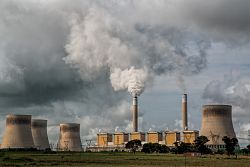

Research has found air pollution caused by burning fossil fuels such as coal and oil was responsible for 8.7 million deaths globally in 2018, which equates to one in five of all people who died that year.
Countries with the most substantial consumption of fossil fuels are suffering the highest death tolls, with the study finding more than one in 10 deaths in both the US and Europe were caused by the resulting pollution, along with nearly a third of deaths in eastern Asia, which includes China. Whereas death rates in South America and Africa were significantly lower.
The death toll is higher than previous estimates and has even surprised the studies researchers. Eloise Marais, a geographer at University College London and study co-author, said: "We were initially very hesitant when we obtained the results because they are astounding, but we are discovering more and more about the impact of this pollution".
"It’s pervasive. The more we look for impacts, the more we find".
The study, which is the result of a collaboration between scientists at Hazard University, the University of Birmingham, the University of Leicester and University College London, states the deaths in 2018 represent a "key contributor to the global burden of mortality and death". The death toll exceeds the combined total of people who die globally each year from smoking tobacco plus those who die of malaria.
Scientists have established links between pervasive air pollution from burning fossil fuels and cases of:
Without fossil fuel emissions, the average life expectancy of the world's population would increase by more than a year, while global economic and health costs would fall by around $2.9 trillion.
The new estimate of deaths was published in the journal Environmental Research and the research deploys a more detailed analysis of the impact of sooty airborne particles thrown out by plants, cars, trucks and other sources. This is known as PM2.5 as the particles are less than 2.5 micrometers in diameter. Once inhaled this pollution can lodge in the lungs and cause a variety of health problems.
Neelu Tummala, an ear, nose and throat physician at George Washington University School of Medicine and Health Sciences, said: "We don’t appreciate that air pollution is an invisible killer".
"The air we breathe impacts everyone’s health but particularly children, older individuals, those on low incomes and people of color. Usually people in urban areas have the worst impacts".
The research has found that China's air is improving but still has high concentrations of fine particles. The US is improving but there are hotspots in the north-east, Europe is mixed and India is a hotspot. George Thurston, an expert in air pollution and health at the NYU School of Medicine, commented on how the death toll outlined in the study may even be smaller than the true picture.
"Overall, however, this new work makes clearer than ever that, when we talk about the human cost of air pollution or climate change, the major causes are one and the same – fossil fuel combustion".
Marais said "Fossil fuels have a really large impact upon health, the climate and the environment and we need a more immediate response".
"Some governments have carbon-neutral goals but maybe we need to move them forward given the huge damage to public health. We need much more urgency".